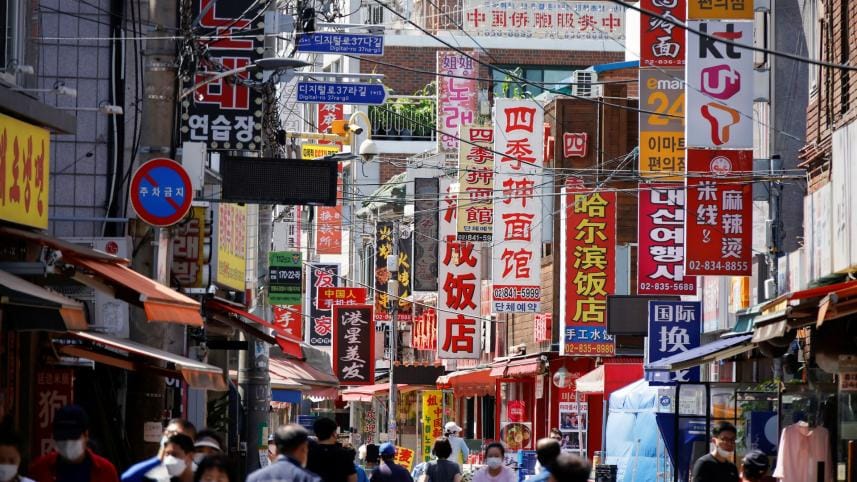Proposed changes to South Korea citizenship law face anti-China headwinds

South Korea is trying to increase its future working population by making it easier for children of foreign residents to become citizens, but its plans have run into trouble in the face of rising anti-China sentiment.
A measure proposed by the Ministry of Justice - first made public in April - called for easing the pathway to citizenship for children born to long-term foreign residents, by simply notifying the ministry.
A presidential petition opposing the revision has gathered over 300,000 signatures. The chatroom of an online hearing held to discuss the proposal in May was overwhelmed with expletive-laced complaints by the tens of thousands of viewers.
The justice ministry has said it is still taking into account public opinion and the advice of experts before submitting the proposal to the Ministry of Government Legislation.
"Given the strong backlash, I would say the ministry has already lost much of the momentum to push ahead with the proposal," said Jang Yun-mi, an attorney who specializes in issues related to children.
The controversy highlights the challenges South Korea faces as it seeks to ensure a robust future population in the face of declining birthrates and rapidly aging workers, and the potential policy implications of increasingly negative views of China, its biggest trading partner.
Data from last year suggests only about 3,930 people would be eligible under the rule change, but the fact that 3,725 of them were of Chinese heritage prompted much of the criticism.
South Korean views have been coloured by what some see as economic bullying by Beijing, its poor handling of the COVID-19 crisis, and the assertion by some Chinese that dearly held aspects of Korean food and culture, such as kimchi and the traditional hanbok dress, have roots in China.
Among immigrant communities, the proposed measures are not seen as worth the backlash, said Kim Yong-phil, editor-in-chief of E Korea World, a local newspaper for Chinese-Koreans.
"Anti-Chinese people could use this issue as a pretext to attack Chinese-Koreans," he said.
POPULATION DECLINE
Naturalization was rare in South Korea until the early 2000s - just 33 foreigners gained South Korean citizenship in 2000, for example – but rose to nearly 14,000 last year, immigration data show.
Of them, nearly 58% were from China, and 30% from Vietnam. The rest included people from Mongolia, Uzbekistan and Japan, Korea Immigration Service data showed.
The latest proposal is needed to encourage future workers to stay by allowing them to foster a South Korean identity from an early age and stably get assimilated into society, the justice ministry told Reuters in a statement.
Kim Yong-seon, who came from China in 2004 to study and was naturalized in 2014, said the amendment is useful as it provides more options for immigrants, but that the more pressing matter is making it easier for adults to become citizens.
"Over the past few years, the requirements for permanent residency and citizenship have only gotten harder," he said, citing changes that require high amounts of income or assets.
Like the majority of Chinese nationals residing in South Korea, Kim is ethnic Korean - his grandfather migrated to China a century ago.
More than 70% of the 865,000 Chinese nationals residing in South Korea are of Korean descent, according to immigration data.
Negative views of China among South Koreans have hit historic highs recently, with as much as 75% having an unfavourable opinion of them late last year, compared to around 37% in 2015, according to Pew Research.
"Some Chinese people are already committing a 'cultural fraud' against the whole world by making unreasonable claims that kimchi and hanbok are also Chinese," opposition People's Party chairman Ahn Cheol-soo said.
"If left as is, it will lead to a 'cultural invasion' in which they claim that even Korea's priceless culture is theirs."



 For all latest news, follow The Daily Star's Google News channel.
For all latest news, follow The Daily Star's Google News channel.
Comments